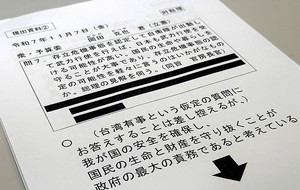Vox Populi, Vox Dei is a daily column that runs on Page 1 of The Asahi Shimbun.
April 8, 2022 at 12:28 JST
In the novel "Kokotsu no Hito" (The Twilight Years), Akiko Tachibana of Tokyo is horrified by her father-in-law Shigezo's abnormal behavior.
He lets out strange shrieks in the middle of the night and locks himself in the bathroom. He does not even recognize his own children.
Written by Sawako Ariyoshi (1931-1984) and published in 1972, the story revolves around an elderly man, whose cognitive functions are deteriorating, and the crushing burden of nursing care that falls on his family.
It became a record-breaking best-seller, and the word "kokotsu" (in a trance) joined the ranks of household buzzwords. The novel was made into a film the following year.
Akiko Kido, 51, a gerontology researcher at J. F. Oberlin University, critically acclaims the work as "a social-problem novel that delved into the dark side of our aging society."
It reportedly influenced then-Prime Minister Kakuei Tanaka's policies, including his decision to establish a private advisory panel on the issue.
Kido has thoroughly researched how people with dementia have been depicted in literary works since the Meiji Era (1868-1912).
In "Yoake-mae" (Before the Dawn) by Toson Shimazaki (1872-1943), an elderly man who manifested abnormal behavior was disparaged and even perceived as a danger to society.
In contrast, younger characters in Ariyoshi's "The Twilight Years" neither fear nor detest the impaired Shigezo--they even refer to him affectionately as "sennin" (a wise hermit) and "yume miru hito" (the dreamer).
That, Kido pointed out, was what decisively sets this novel apart from all past works.
Re-reading it for the first time in many years, however, I realized that many of the words repeated by Ariyoshi--such as "moroku" (dotage) and "jinkaku kesson" (impaired personality)--do come across as harsh and insensitive.
Compared to more recent novels that thoughtfully describe the inner deterioration brought by dementia, Ariyoshi's perceptions of Shigezo are still cold and lacking in empathy.
Still, there is no denying her outstanding achievement of focusing on the reality of the terrible burden borne by the family.
This year marks the 50th anniversary of this groundbreaking novel's publication.
Back when "ninchisho" (dementia) had yet to become a common expression, Ariyoshi was the first author to teach society about the reality of aging that can happen to anyone.
--The Asahi Shimbun, April 4
* * *
Vox Populi, Vox Dei is a popular daily column that takes up a wide range of topics, including culture, arts and social trends and developments. Written by veteran Asahi Shimbun writers, the column provides useful perspectives on and insights into contemporary Japan and its culture.




















A peek through the music industry’s curtain at the producers who harnessed social media to help their idols go global.
A series based on diplomatic documents declassified by Japan’s Foreign Ministry
Here is a collection of first-hand accounts by “hibakusha” atomic bomb survivors.
Cooking experts, chefs and others involved in the field of food introduce their special recipes intertwined with their paths in life.
A series about Japanese-Americans and their memories of World War II